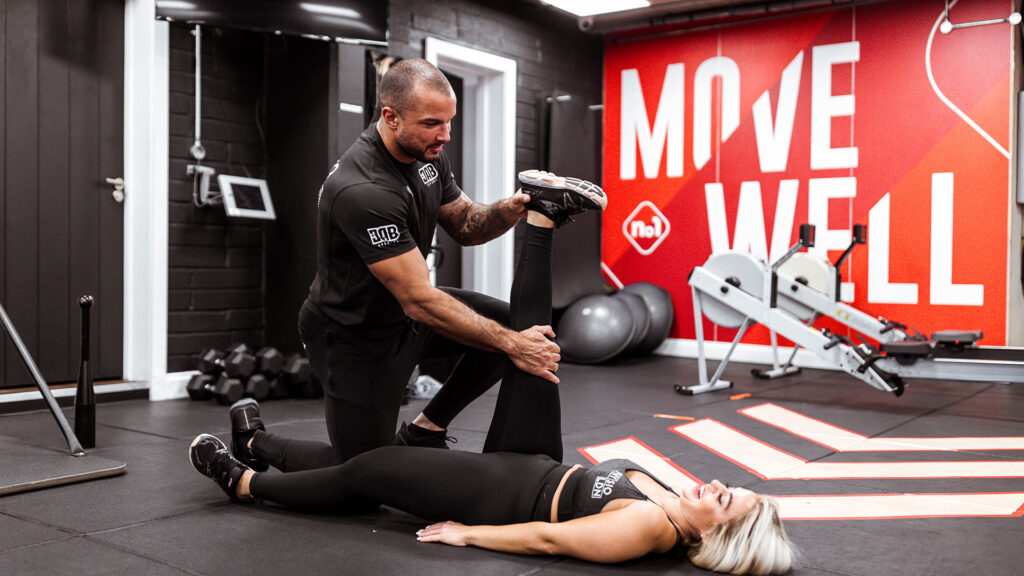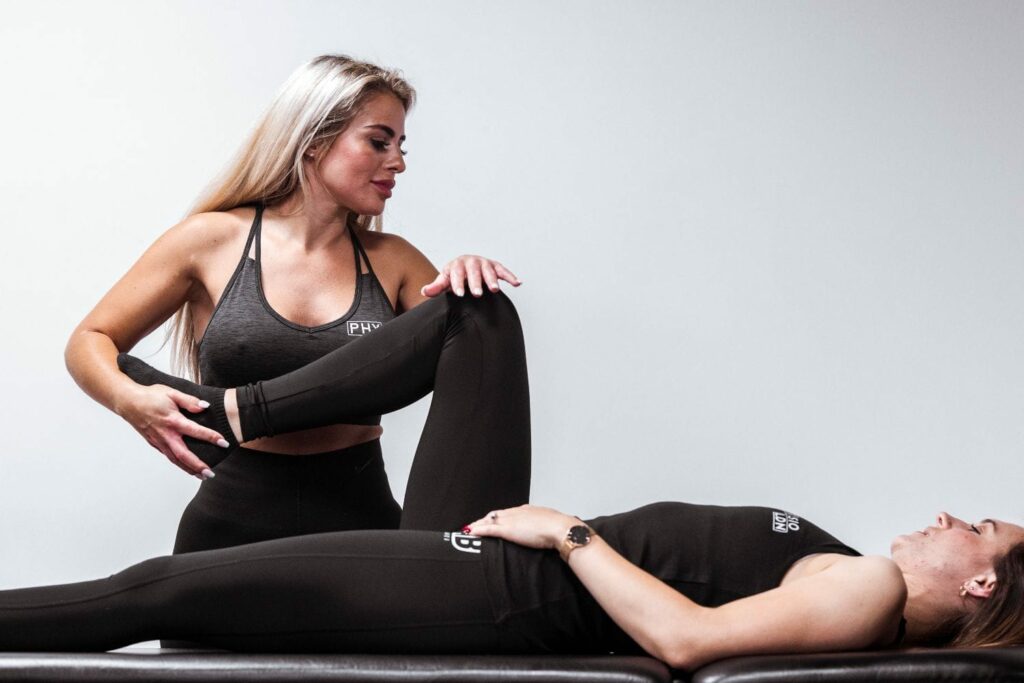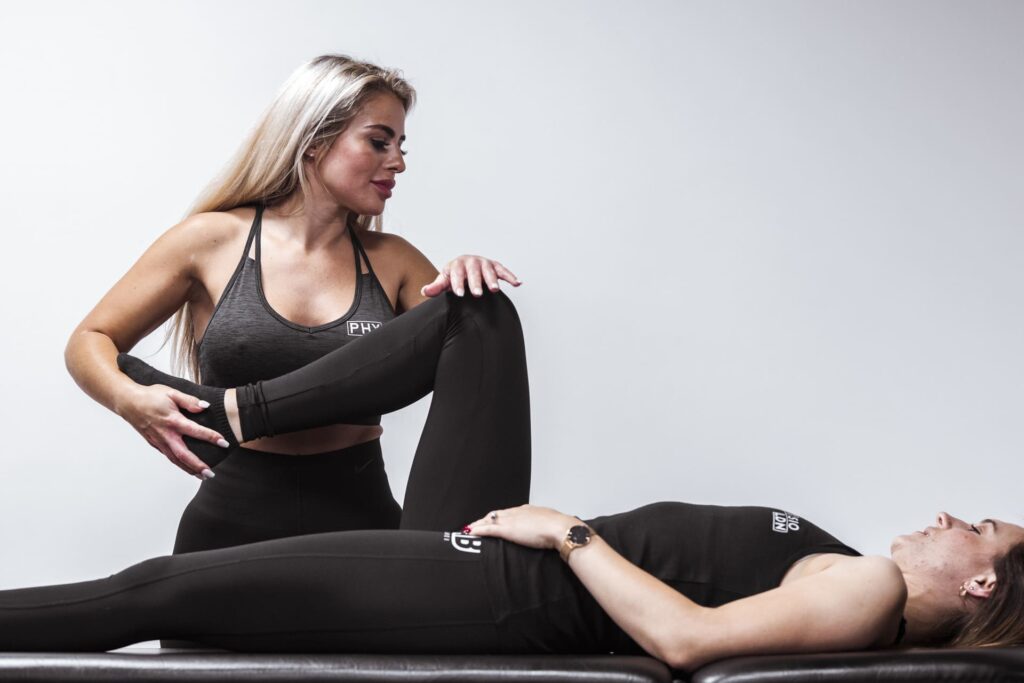Table of Contents
Main Takeaways
- Over 60% of women over 50 experience knee pain, often from osteoarthritis and hormonal changes.
- Estrogen and relaxin affect ligament laxity, inflammation, and pain sensitivity.
- Women face 5–6x higher ACL injury risk than men due to anatomy and hormones.
- Weight management, low-impact exercise, and physiotherapy improve joint health.
- Clinics like One Body LDN offer tailored rehab and deep tissue massage for long-term relief.
Knee pain is a common complaint among women, especially as they age. Research shows that a significant proportion of women over 50 experience persistent or intermittent knee pain, with studies indicating that 63% of women aged 50 and older reported knee pain over a 12-year period. This issue not only affects physical mobility but also impacts emotional well-being and social life. Understanding the causes, hormonal influences, and treatment options is essential for managing knee pain effectively and improving quality of life.
In this article, we will explore the primary causes of knee pain in females, the role of hormones and lifestyle factors, and practical tips for effective knee pain treatment and prevention. Whether you are experiencing knee discomfort or seeking to support someone who is, this comprehensive guide aims to provide valuable insights backed by the latest research and expert advice.
What Causes Knee Pain in Females
Knee pain in women can arise from a variety of causes, ranging from acute injuries to chronic conditions. One of the most prevalent causes is osteoarthritis, a degenerative joint disease that affects the cartilage and surrounding tissues. Women with knee osteoarthritis often report more severe pain and inflammation compared to men. A study from the Hospital for Special Surgery found that women exhibit higher markers of inflammation in their blood and increased tissue inflammation, which contributes to greater pain levels.

Injuries such as anterior cruciate ligament (ACL) tears are also more common in women, occurring 5 to 6 times more frequently in female athletes than in males. This disparity is partly due to anatomical and biomechanical differences, as well as hormonal influences. Women are generally 2 to 8 times more likely to suffer from knee pain and injuries overall, according to data from NJ Spine & Orthopedic.
Other contributing factors include repetitive strain from occupational activities, with certain professions like carpentry and mining showing much higher rates of knee pain prevalence. A study involving over 4,000 adults aged 40-80 reported an overall knee pain prevalence of 28%, with carpenters experiencing 4.6 times higher rates than the general population. This highlights the impact of mechanical stress and overuse on knee health.
Additionally, hormonal changes throughout a woman’s life can significantly affect knee health. For instance, during pregnancy, the body produces relaxin, a hormone that helps prepare the body for childbirth by loosening ligaments. While this is beneficial for childbirth, it can also lead to increased joint laxity and instability, making women more susceptible to knee injuries.
Post-menopausal women may also experience a decline in estrogen levels, which has been linked to a decrease in bone density and an increased risk of osteoarthritis, further complicating knee health.
Moreover, lifestyle factors such as obesity and physical inactivity can exacerbate knee pain. Excess body weight places additional stress on the knee joints, leading to accelerated wear and tear of cartilage. A study published in the journal *Obesity* found that even a modest weight loss can significantly reduce knee pain and improve function in overweight women suffering from osteoarthritis.
This underscores the importance of maintaining a healthy weight and engaging in regular, low-impact exercise to support joint health and alleviate pain.
Hormonal and Lifestyle Factors
Hormones play a critical role in why women tend to experience more intense knee pain and poorer outcomes following knee injuries. Research from UT Southwestern Medical Center in 2025 developed a computer model demonstrating how sex hormones influence knee injury recovery, explaining the higher susceptibility and severity of symptoms in women. Fluctuations in estrogen and other hormones can affect ligament laxity, inflammation, and pain sensitivity, making women more vulnerable to knee problems.

Moreover, lifestyle factors such as physical activity levels, body weight, and occupational demands contribute significantly to knee health. While women with knee osteoarthritis report higher pain and impaired function, studies show that their levels of depression, anxiety, and physical activity do not differ significantly from men, suggesting that biological and physiological differences are key drivers of pain disparities rather than psychological factors alone. This insight was supported by a 2024 study published on PubMed.
Additionally, knee pain has a profound emotional impact on women. A 2018 survey by DePuy Synthes revealed that 90% of women aged 45-65 with knee or hip pain felt it adversely affected their mood, and two-thirds avoided social situations as a result. This connection between physical pain and emotional well-being underscores the importance of addressing knee pain holistically.
Furthermore, the interplay between hormonal fluctuations and lifestyle choices can create a complex web of challenges for women. For instance, during perimenopause and menopause, the decline in estrogen not only exacerbates joint pain but also influences body composition, leading to increased fat accumulation around the abdomen, which can further strain the knees.
This cyclical relationship highlights the need for targeted interventions that consider both hormonal therapies and lifestyle modifications, such as weight management and strength training, to improve outcomes for women suffering from knee pain.
In addition to these factors, the role of nutrition cannot be overlooked. Diets rich in anti-inflammatory foods, such as omega-3 fatty acids found in fish, nuts, and seeds, can help mitigate some of the inflammatory responses associated with knee pain. Conversely, diets high in processed sugars and unhealthy fats can exacerbate inflammation and contribute to joint deterioration.
As women navigate the complexities of hormonal changes and their effects on knee health, incorporating a balanced diet may serve as a crucial component in alleviating symptoms and enhancing overall quality of life.
Treatment and Prevention Tips
Effective management of knee pain in women requires a tailored approach that addresses the root causes and individual needs. Physiotherapy is a cornerstone of treatment, offering hands-on techniques, exercise rehabilitation, and lifestyle advice to reduce pain and restore function. London’s One Body LDN physiotherapy clinics are renowned for their expert care, with therapists receiving over five times the required regulatory training.
Their approach combines deep tissue massage, joint mobilisations, and bespoke exercise plans to provide immediate relief and long-term recovery. Patients can benefit from a free initial assessment to develop a personalized knee pain treatment in London plan.

Preventive strategies include maintaining a healthy weight, engaging in low-impact exercises such as swimming or cycling, and strengthening the muscles around the knee to improve joint stability. Avoiding repetitive strain and incorporating ergonomic adjustments in daily activities can also reduce the risk of knee problems.
For athletes, proper training techniques and injury prevention programs are essential, especially considering the higher incidence of ACL injuries among women. Additionally, incorporating flexibility and balance training can further enhance joint function and reduce the likelihood of injuries. Practices such as yoga or Pilates not only promote physical strength but also improve mental well-being, which is crucial for overall health.
See our blog knee pain relief exercises.
When conservative treatments are insufficient, medical interventions such as anti-inflammatory medications or surgical options may be considered. However, early intervention with physiotherapy and lifestyle modifications often leads to better outcomes and reduces the need for invasive procedures.
It’s important for patients to remain proactive about their health, regularly consulting with healthcare knee professionals in London to monitor their condition and adapt their treatment plans as necessary. This collaborative approach can empower individuals to take control of their recovery journey and make informed decisions about their health.
For those seeking expert physiotherapy in London, One Body LDN offers comprehensive services across multiple locations, combining evidence-based treatments with a patient-centred approach. Their commitment to ethical practice, transparent pricing, and a no-risk service guarantee ensures high-quality care without pressure or upselling.
Furthermore, the clinic’s focus on continuous education and community engagement means that patients benefit from the latest advancements in physiotherapy. Workshops and seminars are often held to educate the public on injury prevention and wellness strategies, fostering a supportive environment for those dealing with knee pain and other musculoskeletal issues.
FAQs
Why do women experience more knee pain than men?
Women are more prone to knee pain due to a combination of hormonal influences, anatomical differences, and higher rates of conditions like osteoarthritis and ACL injuries. Hormones such as estrogen affect ligament laxity and inflammation, which can increase pain sensitivity and injury risk. Additionally, women often have a wider pelvis, which can alter the alignment of the knee joint and increase stress on the ligaments and cartilage. This anatomical variation can lead to a higher incidence of knee-related issues, particularly in active women who engage in sports or high-impact activities.
Can physiotherapy help with knee pain in women?
Yes, physiotherapy is highly effective in managing knee pain. It involves hands-on treatments, exercise rehabilitation, and lifestyle advice to reduce pain, improve mobility, and prevent further injury. Clinics like One Body LDN in London specialise in personalised physiotherapy programs for women. They assess individual needs and develop tailored treatment plans that may include modalities such as ultrasound therapy, manual therapy, and specific strengthening exercises aimed at stabilising the knee joint. Furthermore, physiotherapy can also educate patients on proper body mechanics and ergonomics to prevent future injuries.
What lifestyle changes can reduce knee pain?
Maintaining a healthy weight, engaging in regular low-impact exercise, strengthening knee-supporting muscles, and avoiding repetitive strain can all help reduce knee pain and improve joint health. Incorporating activities like swimming, cycling, and yoga can enhance flexibility and strength without putting excessive pressure on the knees. Additionally, a balanced diet rich in anti-inflammatory foods, such as omega-3 fatty acids, fruits, and vegetables, can also play a significant role in managing inflammation and promoting overall joint health. Staying hydrated is equally important, as it helps maintain the viscosity of synovial fluid, which lubricates the joints.
Is knee pain in women linked to emotional health?
Yes, knee pain can significantly impact mood and social engagement. Studies show that many women with knee pain experience negative emotional effects, highlighting the need for holistic treatment approaches. Chronic pain can lead to feelings of frustration, anxiety, and even depression, as it may limit participation in social activities and physical exercise. Addressing the emotional aspects of pain through counseling, support groups, or mindfulness practices can be beneficial. Integrating psychological support into treatment plans can help women develop coping strategies and improve their overall quality of life.
Are women more likely to suffer ACL injuries?
Yes, female athletes are 5 to 6 times more likely to experience ACL tears than male athletes, due to biomechanical and hormonal factors. Proper training and preventive measures are crucial to reduce this risk. Research indicates that women may have different landing mechanics and muscle activation patterns, which can increase the likelihood of injury during sports activities. Programs focusing on neuromuscular training, which includes plyometric exercises and agility drills, can help improve coordination and strength, thereby reducing the risk of ACL injuries in women.
Where can I find expert physiotherapy for knee pain in London?
One Body LDN offers award-winning physiotherapy services across multiple London locations. Their expert team provides thorough assessments, hands-on treatments, and personalised rehab plans to help women manage and overcome knee pain effectively. In addition to traditional physiotherapy, they may also offer innovative treatments such as dry needling, acupuncture, and advanced modalities like shockwave therapy, which can enhance recovery. Patients can benefit from a supportive environment where practitioners focus on empowering women to take control of their health and well-being through education and active participation in their recovery journey.
Take Control of Your Knee Pain with One Body LDN
If you’re struggling with knee pain and looking for expert care, One Body LDN is here to help. Voted as the best London physio clinic by thousands, our award-winning team specializes in musculoskeletal physiotherapy, post-operative care, and sports injuries. We’re committed to fixing the root cause of your problem with our expert assessments and personalized rehab plans. Our physios, including former athletes and NHS specialists, provide exercise rehab blended with deep tissue massage to alleviate your pain and have you feeling amazing. Don’t let your symptoms become long-term; book your free initial assessment at our clinic today and experience instant pain relief without the worry of being oversold treatments. We’re results-based and ready to support your journey to optimal health, whether you’re an office worker or an elite athlete.


